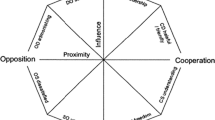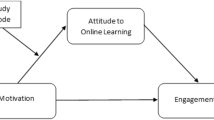Abstract
This study applied a learningorganisation framework to understand academicdepartments' efforts to improve teachingquality. The theoretical framework wasgenerated from literature on learningorganisations, organisations devoted tocontinuous improvement through continuouslearning. Research questions addressedrelationships among departments' vision,leadership, knowledge management,communication, learning culture, and teachingimprovement. Using survey data collected fromdepartment chairs, this study found a positiveassociation between learning organisationbehaviours and the improvement of teaching.
Similar content being viewed by others
REFERENCES
Alfred, R. Roseaver, S. (2000). Organizational Structure, Management, and Leadership for the Future. In A.M. Hoffman R.W. Summers (eds), Managing Colleges and Universities: Issues for Leadership. Westport, CT: Bergin Garvey, 1-28.
Angelo, T.A. (2000). Transforming Departments into Productive Learning Communities. In A.F. Lucas Associates (eds), Leading Academic Change: Essential Roles for Department Chairs. San Francisco: Jossey-Bass Inc., 74-89.
Barak, R.J. Breier, B.E. (1990). Successful Program Review: A Practical Guide to Evaluating Program Sin Academic Settings. San Francisco: Jossey-Bass, Inc.
Barker, R.T. Camarata, M.R. (1998, Octobert). The Role of Communication in Creating and Maintaining a Learning Organization: Preconditions, Indicators, and Disciplines, The Journal of Business Communication 35, 1-14.
Bennett, J.K. O'Brien, M.J. (1994, June). The Building Blocks of the Learning Organization, Training, 41-49.
Bensimon, E.M., Ward, K. Sanders, K. (2000). The Department Chair's Role in Developing New Faculty and Scholars. Bolton, MA: Anker Publishing.
Birnbaum, R. (2000). Management Fads in Higher Education: Where They Come from, What They Do, Why They Fail. San Francisco: Jossey Bass, Inc.
Bok, D. (1994, April). Reclaiming the Public Trust, Case Currents 22, 25-28.
Boyer Commission on Educating Undergraduates in the Research University (1998). Reinventing Undergraduate Education: A Blueprint for America's Research Universities. Stony Brook, NY: State University of New York.
Braxton, J.M. Hargens, L.L. (1995). Variation among Academic Disciplines: Analytical Frameworks and Research. In J.C. Smart (ed.), Higher Education: Handbook of Theory and Research, vol. 11. New York: Agathon Press, 1-46.
Cannon, R. (2001, Winter). Broadening the Context for Teacher Evaluation. In C. Knapper P. Cranton (eds), Fresh Approaches to the Evaluation of Teaching. New Directions for Teaching and Learning. San Francisco: Jossey-Bass Inc., 87-97.
Cashin, W.E. (1995). Student Ratings of Teaching: The Research Revisited. (Idea Paper #32). Manhatten, KS: Kansas State University, IDEA Center.
Cleveland, J. Plastrik, P. (1995). Learning, Learning Organizations, and TQM. In A.M. Hoffman D.J. Julius (eds), Total Quality Management: Implications for Higher Education. Maryville, MO: Prescott, pp. 233-243.
Cole, J.R. (1994). Balancing Acts: Dilemmas of Choice Facing Research Universities. In J.R. Cole, E.G. Barber S.R. Gruabard (eds), The Research University in a Time of Discontent. Baltimore: The Johns Hopkins University Press, 1-36.
Creswell, J.W., Wheeler, D.W., Seagren, A.T., Egly, N.J. Beyer, K.D. (1990). The Academic Chairperson's Handbook. Lincoln: University of Nebraska Press.
Cyert, R. (1991, Spring). Quality Through Department Heads, Planning for Higher Education, 67-69.
Dill, D.D. (1999). Academic Accountability and University Adaptation: The Architecture of an Academic Learning Organization, Higher Education 38, 127-154.
Franklin, J. (2001, Fall). Interpreting the Numbers: Using a Narrative to Help Others Read Student Evaluations of Your Teaching Accurately. In K.G. Lewis (ed.), Techniques and Strategies for Interpreting Student Evaluations. New Directions for Teaching and Learning. San Francisco: Jossey-Bass Inc., 85-100.
Freed, J.E. Klugman, M.R. (1997). Quality Principles and Practices in Higher Education. Phoenix, AZ: The Oryx Press.
Gardiner, L.F. (2000). Monitoring and Improving Educational Quality in the Academic Department. In A.F. Lucas Associates (eds), Leading Academic Change: Essential Roles for Department Chairs. San Francisco: Jossey-Bass Inc., 165-194.
Garvin, D.A. (2000). Learning in Action: A Guide to Putting the Learning Organization to Work. Boston: Harvard Business School Press.
Gephart, M.A., Marsick, V.J., Van Buren, M.E. Spiro, M.S. (1996, December). Learning Organizations Come Alive, Training and Development, 35-45.
Goh, S.C. (1998, Autumn) Toward a Learning Organization: The Strategic Building Blocks, SAM Advanced Management Journal 63(2), 15-21.
Hatfield, S.R. (1999). Department Level Assessment: Promoting Continuous Improvement (Idea Paper #35). Manhatten, KS: Kansas State University, IDEA Center.
Lei, D., Slocum, J. Pitts, R.A. (1999, Winter). Designing Organizations for Competitive Advantage: The Power of Unlearning and Learning, Organizational Dynamics, 1-24.
Lucas, A.F. (1994). Strengthening Departmental Leadership: A Team Building Guide for Chairs in Colleges and Universities. San Francisco: Jossey-Bass Inc.
Marchese, T.J. (1997). Sustaining Quality Enhancement in Academic and Managerial Life. In M.W. Peterson, D.D. Dill, L.A. Mets Associates (eds), Planning and Management for a Changing Environment: A Handbook on Redesigning Postsecondary Institutions. San Francisco: Jossey-Bass Inc., 502-520.
Marincovich, M. (1998). Ending the Disconnect between the Student Evaluation of Teaching and the Improvement of Teaching: A Faculty Developer's Plea (Report No. NCPI-4-02). Stanford, CA: National Center for Postsecondary Improvement. (ERIC Document Reproduction Service No. HE 031 907).
Marsh, H.W. Dunkin, M.J. (1997). Students' Evaluations of University Teaching: A Multidimensional Perspective. In R.P. Perry J.C. Smart (eds), Effective Teaching in Higher Education: Research and Practice. New York: Agathon Press, 241-320.
Marsick, V.J. Watkins, K.E. (1999). Facilitating Learning Organizations: Making Learning Count. Brookfield, VI: Gower.
Massy, W., Wilger, A. Colbeck, C. (1994, July/August). Department Cultures and Teaching Quality: Overcoming “Hollowed” Collegiality, Change 26, 11-20.
Murray, J. (1997). Successful Development and Evaluation: The Complete Teaching Portfolio (ASHE-ERIC Higher Education Report No. 8). Washington, DC: The George Washington University, Graduate School of Education and Human Development.
Nevis, E.C., DiBella, A.J. Gould, J.M. (1995, Winter). Understanding Organizations as Learning Systems, Sloan Management Review, 73-85.
O'Banion, T. (1997). Learning College for the 21st Century. Phoenix, AZ: Oryx Press.
Peterson, M.W. Dill, D.D. (1997). Understanding the Competitive Environment of the Postsecondary Knowledge Industry. In M.W. Peterson, D.D. Dill L.A. Mets (eds), Planning and Management for a Changing Environment: A Handbook on Redesigning Postsecondary Institutions. San Francisco: Jossey-Bass, Inc., 3-29.
Rea, L.M. Parker, R.A. (1997). Designing and Conducting Survey Research: A Comprehensive Guide. San Francisco: Jossey-Bass, Inc.
Rhodes, F.H.T. (1994). The Place of Teaching in the Research University. In J.R. Cole, E.G. Barber S.R. Gruabard (eds), The Research University in a Time of Discontent. Baltimore: The Johns Hopkins University Press, 179-189.
Senge, P.M. (2000). The Academy as a Learning Community: Contradiction in Terms or Realizable Future? In A.F. Lucas Associates (eds), Leading Academic Change: Essential Roles for Department Chairs. San Francisco: Jossey-Bass Inc., 275-300.
Senge, P.M. (1994). The Fifth Discipline: The Art and Practice of the Learning Organization. New York: Doubleday.
Tucker, A. (1992). Chairing the Academic Department: Leadership among Peers. New York: Macmillan.
Trow, M. (1998). On the Accountability of Higher Education in the United States. In W.G. Bowen H.T. Shapiro (eds), Universities and Their Leadership. Princeton: Princeton University Press, 15-61.
Wergin, J.F. (1994). The Collaborative Department: How Five Campuses are Inching toward Cultures of Collective Responsibility. Washington, DC: American Association for Higher Education.
Wright, W.A. O'Neil, M.C. (1994). Teaching Improvement Practices: New Perspectives. In E.C. Wadsworth (ed.), To Improve the Academy: Resources for Faculty, Instructional, and Organizational Development. Stillwater, OK: New Forums Press, 5-37.
Author information
Authors and Affiliations
Rights and permissions
About this article
Cite this article
Collie, S.L., Taylor, A.L. Improving Teaching Quality and the Learning Organisation. Tertiary Education and Management 10, 139–155 (2004). https://doi.org/10.1023/B:TEAM.0000023841.31495.6a
Issue Date:
DOI: https://doi.org/10.1023/B:TEAM.0000023841.31495.6a




